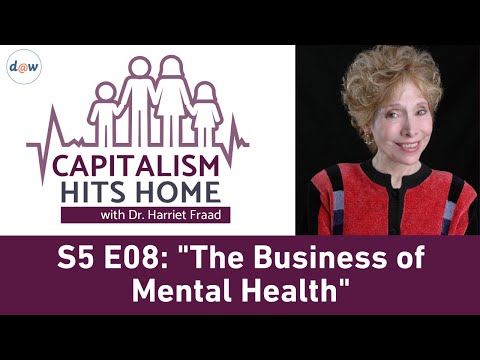Capitalism Hits Home: The Business of Mental Health

hello this is dr harriet fraad with capitalism hits home a show about the interactions of our personal life with our political economic and social lives if you like capitalism hits home and of course i hope you do i recommend that you check out democracy at work's other shows like economic update with richard wolff that talks about and explains what's really going on politically and economically in the united states you can go to www dot democracy at work and look at all the books and shows we have to offer which are many and very exciting and i want to thank you and thank our growing audience for listening for getting friends to listen and for being patreon members that make financial contributions that make this show possible today i want to talk about an interpersonal matter that really does affect us one out of four american women take an antidepressant drug that's wild why is this happening and in order to explain why it's happening i want to address the four horsemen of the mental health apocalypse in the united states and they are doctors particularly psychiatrists who are mds and therefore have far greater incomes and prestige second is the enormous and most profitable sector of the pharmaceutical industry psychopharma the third is insurance companies and the fourth horseman of the apocalypse is hospitals now this is the way it works doctors see patients and medical doctors and psychiatrists have to be medical doctors see patients and push their misery into a diagnostic category and every year the diagnostic statistical manual expands its categories so that all forms of human misery have a diagnosis which should be of course addressed by a drug and what has happened is terrible damage i'll talk about the diagnostic statistical manual later in more detail the diagnoses that the doctors give are plugged in to the diagnostic statistical manual highly financed by the drug companies the psychiatrists who are actually psychopharmacists plug people's misery into a diagnosis a disorder and then prescribe drugs on the basis of that disorder so almost all of human misery is not accepted as something from which you might learn or to which you could address yourself in the way you live your life but is a brain disease whoa i'll get back to that later too the patient then submits the bills from the psychiatrist to her or his or their insurance company insurance companies require severe diagnoses for compensation so a psychiatrist or any other mental health practitioner covered by insurance and of course psychiatrists are paid the most by medical insurance they become psychopharmacists in part because they're only paid a hundred dollars an hour instead of the four or five hundred they'd be paid otherwise so they see lots of people for a few minutes each and can bill the insurance companies for between three and five hundred dollars an hour or more they understand doctors understand that they better give a severe and so does everyone else in the mental health industry who's covered by insurance that they better give a severe diagnosis or the insurance company won't handle it so people walk away with a sense that they are severely mentally ill when actually they're just suffering human suffering is something that can teach us something you can look at how did i get here why am i so miserable how do i find my way out rather than considering my suffering some kind of brain disorder or brain disease now what about these psychiatrists well the first place they get more prestige by calling the pain of life a disease because then they're like real doctors addressing diseases and that's particularly bizarre because there's no proof at all that these are diseases and that those diseases could be addressed with pills in fact in 75 percent of the cases of a mass study done by whitaker in the british public health system of course in the united states all studies of pharmaceuticals are sponsored by the companies that are making the pharmaceuticals which does cast a bit of doubt on those studies i had a client who was a scientist and who quit because she was so pushed to lie about the results of the medications that she couldn't stand it with her own integrity she left but what you have is you have human misery converted into a disease model and it's bizarre and unproven there is no no proof there's this very good book called cracked but and why psychiatry is doing more harm than good but the literature is actually enormous this is just a very available easy readable book and what happens is that if you get a headache you take an aspirin that doesn't mean that you had a brain disease that was addressed by the aspirin it could be that you had a hard day it could be you had an uncomfortable breakup and so you got a headache it could be that there's some issue that bothers you it could be that you got drunk the night before or couldn't sleep well so the fact that you had a headache and the aspirin helped it doesn't mean that you had a brain disease and the aspirin is more helpful than most drugs i was saying before that whitaker in a study of thousands found that the basic psychic drugs were no more effective in patients than a sugar pill now how come that is why well i think what happens is there's something called the hawthorne effect when people take a medication particularly if it has side effects so they think oh yeah this is really working and all these psych meds have side effects when they take the medication they believe so much that it will work that there's a psychological mechanism that tells them it's working and when it has side effects they think yeah these side effects show me that it's really working well that isn't the case the medications have side effects they usurp some of the brain's own capacity to soothe itself and they often cause dizziness sickness in the case of prozac though it was repressed at first if you start getting a rash around your joints it can mean you're going to die so that's a severe one but they're mainly not so severe and when you try to wean yourself off you'd better be careful and titrate your doses carefully because it has severe effects doesn't have severe effects to improve your mood or your pain psychologically but only and when it does it's only because you imagine it does and so that these nut drugs are not only dangerous they're not proven and they're not effective you can't get many other drugs on the market unless there's severe corruption which of course there is unless there's proven research there is no proven research of brain disease wow so anyway on the basis of brain disease psychiatrists prescribe psych meds and we have to look at these doctors well there's a lot of corruption here doctors are paid a minimum psychiatrist excuse me that's what i'm talking about here are paid a minimum of 30 grand a year extra for having occasional seminars where they call together fellow or sister psychiatrists and give a little talk on the wonders of the drug that's being hustled very subtly by their marvelous marvelous description of the effectiveness of this drug a company representative is there at the gathering the company provides wine and cheese and the company if you say anything critical the company lets you know that you might be pushed right off the gravy train if that continues and those subsidies are as low as 30 grand a year but in the case of let's say the zyprexa which was told by advertised by dr biederman as effective on children and children's depression it wasn't but he got 3.2 million dollars plus he johnson johnson gave him a whole wing for his research harvard looked up to him he was at the time the head of the child psychiatry association so he was a real find for johnson and johnson and he published articles which the company looked over the makers of zyprexa looked over and edited for him in some cases the company writes the article and all the psychiatrist has to do is sign it and the more prestigious he or she is the more publicity and the more publicity in medical journals so even in a place like england where they don't allow direct to consumer advertising of drugs the way the articles are written and subsidized is a huge subsidy and after the article is written the doctor doesn't have to give at along with his name all the companies from which he is getting funds so that's another form of bribery another one in the united states is direct to consumer advertising we are the only nation in the developed world that allows unrestrained direct to consumer advertising new zealand allows advertising of drugs but it only under certain conditions and there's a movement in new zealand to change that so most patients can go to their psychiatrist and say oh i saw this on tv or i saw it on the internet i want this drug and there's a demand that comes because they don't know the lack of science behind it they don't really know the side effects and even where it's prescribed and you buy it there's a description in teeny weeny little print of the possible side effects which people don't read because after all their esteemed doctor recommended the drug also the doctors are in collusion with marketers and drug stores recently there was a big scandal about oxycontin which was given for physical pain but also for psychological pain people took it and not only was the sackler family sued for billions because they knew it wore off and that people were addicted and in terrible pain but they repressed that and they bribed the medical community by endowing you know they made billions from this drug i think it was 37 billion so they endowed medical chairs at prestigious medical schools they created wings at hospitals and they may and they subsidized journals so people did not look this gift horse in the mouth to see that the teeth were rotten and that this was a highly addictive dangerous substance now the next horseman in this four horsemen apocalypse is the insurance companies insurance will only compensate a patient who has a diagnosis from the diagnostic statistical manual which plugs human misery into a disease model and every year those disease models expand now some can be contracted they used to think of homosexuality as a disorder and brain disease they don't anymore because the political movement of gays and lesbians have made that impossible culturally and these diagnostics are culturally formed you know there there's a text from a meeting of the psychiatrists who decide what's a disorder i think there's about 10 of them who sit down they're all prestigious and someone brought up a particular disorder and said this should be included and one of the psychiatrists said no it shouldn't i have that so they crossed it off that's how scientific this process is at any rate insurance companies require reports i don't take insurance because they ask for a lot of personal information they also ask practitioners to justify why they're not medicating their patients which is i think bizarre then the fourth horseman of this apocalypse is hospitals it's doctors who enter who decide that their patients should be in in mental hospitals where they stay until their insurance runs out then they're ostensibly cured or whatever but they're thrown out and the patient in addition to their other miseries is subjected to excess complicated billing which is very difficult to maintain now because this society this brain disease model which most americans think is true is believed patients stigmatize themselves they think oh my god i have a brain disease they have no idea they don't have a brain disease you have a problem life is full of problems and with some help with a fellow traveler who's educated you can get out of those problems sometimes you can get out with a fellow traveling listener who isn't educated but in any case it's not a medical problem it's not a brain disease and people who think that people have brain diseases are much harsher on those people they find them more dangerous in studies of people asked to give a shock to someone who makes a mistake if they're informed that these people have a brain disease they give them many more shocks than thinking this is a person who's normal but just has a problem because there's a lot of stigma about a brain disease plus people who think they have a disease and are taking a pill just to maintain life not to cure it feel incurable they feel condemned and if you believe in that model you are condemned you're also disempowered if you go to a therapist a talk therapist in any number of practices you are empowered in my hypnosis practice when i do that the person is empowered they are basically taught that if you have a problem you also have a solution that you can't find and will help you find it not you have a problem you have a disease will medicate you to keep that disease at bay by the way never cure it until you die now what happened what happened to create this and when did it start happening it started happening in the 1980s the era of ronald reagan and margaret thatcher the era where capitalist commodification of everything rose the era when ronald reagan began to smash the unions in the united states with the flight attendants union and where in parallel fashion thatcher smashed the miners union where corporations became totally ascendant this was a terrible terrible thing for both the british and the americans was such a terrible thing that they found in the study which i think is very interesting i'll find it somewhere here i hope that um english-speaking countries have the most human misery and out of the 34 wealthier countries they studied some of which are not very wealthy like ecuador or nigeria the united states was 30th out of 34 in terms of happiness it had 30 there were only five yeah i know there were only four countries or five countries that had greater human misery and reported greater human misery than the united states england was even worse and they subscribe to the disease model which obviously is not ameliorating misery even though one in four americans is taking a psych drug now that can be an ending of part one because part two we should go over what the dsm is about the diagnostic statistical manual is about why it is so voluminous and how human misery got commodified into a disease model that then was prescribed a drug that doesn't cure it it's really a hoax and as a practitioner who's been in practice for 47 years i have helped numerous people out of miserable situations and out of the human misery in which they found themselves usually for good reason and i totally reject the disease model the medicalized model that gives psychiatrists prestige and lies that there's brain diseases that we don't have and i should say that this is a really good book the neuroscience of psychotherapy by Cozolini and with the forward by siegel they're both brilliant brain scientists some of the most well-known and prestigious and what Cozolini shows in this book is that every feeling that you have every experience that you have has a bio chemical component and so looking at the biochemistry of someone who's unhappy doesn't mean that they need a pill it means that for every experience and every understanding there's a biochemical component and as you change that understanding and as you deal with that experience your biochemistry corrects itself it's not chemical imbalance for which people need drugs even chemical imbalances that they ascribe to things like schizophrenia no those are diagnoses put on things that they don't want to work out with their patients there's a wonderful book it's over here the girl on the bridge by tracy higgins about how she cured herself of what they called schizophrenia and there's many other examples of people dealing with the trauma of their lives and releasing the pent-up emotions that disturb them so deeply so we are part of a capitalist hoax here and we need to change it and that capitalist hoax is one of the reasons that a poor little country like cuba which has a doctor for every 12 people and works on preventive medicine creating joy creating connection creating hope in their citizens is not afflicted by these things but that really afflict americans now this is the end of the first part of my discussion of this and i want to thank you so much for listening and i want to ask you if you like this to suggest it to your friends and also to go on www.democracyatwork and look at their books and look at all their podcasts and everything they have to offer because i think it's worth it also for our patreon listeners a special thank you i'm not saying everyone has the discretionary income to help although we welcome a dollar a month as well as a million of course but we thank you for your generosity and we thank everyone else for listening and spreading the word thank you goodbye for now
2022-04-17 09:45


